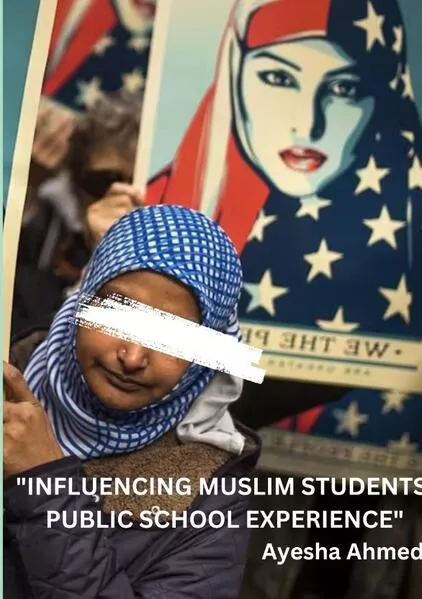
Ayesha Ahmed
"Influencing Muslim Students' Public School Experience"
ISBN: 978-3-384-24392-8
106 Seiten | € 15.00
Buch [Taschenbuch]
Erscheinungsdatum:
30.05.2024
Politik
Ayesha Ahmed
"Influencing Muslim Students' Public School Experience"
ChatGPT
This qualitative inquiry embarked on a profound and introspective exploration into the myriad challenges confronted by Muslim students within the educational landscape of the United States, particularly in the wake of the seismic events of September 11th. With a resolute focus on elucidating the pivotal role played by educational leaders in shaping the educational journeys of Muslim students within the public school domain, the research odyssey unfolded through a series of intimate one-on-one, semi-structured interviews with three educational leaders directly immersed in serving this distinct demographic. Despite the inherent constraints and limitations inherent to the study, the interviews yielded a treasure trove of insightful revelations, coalescing into three overarching thematic pillars that served to underscore the profound and enduring impact of educational leadership on the lived experiences of Muslim students.
The first thematic strand illuminated the indispensable significance of cultural fluency and contextual understanding wielded by educational leaders, affording them the acumen and dexterity to conceive and enact bespoke accommodations meticulously tailored to the idiosyncratic needs and exigencies of Muslim students. This bespoke approach, in turn, served as the cornerstone for cultivating an ethos of inclusivity and supportiveness, thus fostering an educational milieu wherein Muslim students felt acknowledged, validated, and empowered to thrive. Delving deeper into the labyrinth of insights gleaned, the second thematic vein unveiled the transformative potency inherent in educational leaders' unwavering commitment to advocating for social justice through the embrace and implementation of inclusive practices. This steadfast commitment served as a potent antidote against the pervasive undercurrents of Islamophobia and bias, thereby fortifying the sense of belonging and acceptance among Muslim students within the crucible of the educational arena.
Furthermore, the third thematic locus underscored the paramount importance of cultural responsiveness interwoven with a compassionate and reflexive ethos embraced by educational leaders. This nuanced approach not only engendered a climate of trust and reciprocity but also facilitated a profound and empathic comprehension of the lived experiences and exigencies of Muslim students. In so doing, it engendered the emergence of warm, nurturing sanctuaries within the educational ecosystem, wherein Muslim students felt seen, heard, and valued.
This qualitative inquiry embarked on a profound and introspective exploration into the myriad challenges confronted by Muslim students within the educational landscape of the United States, particularly in the wake of the seismic events of September 11th. With a resolute focus on elucidating the pivotal role played by educational leaders in shaping the educational journeys of Muslim students within the public school domain, the research odyssey unfolded through a series of intimate one-on-one, semi-structured interviews with three educational leaders directly immersed in serving this distinct demographic. Despite the inherent constraints and limitations inherent to the study, the interviews yielded a treasure trove of insightful revelations, coalescing into three overarching thematic pillars that served to underscore the profound and enduring impact of educational leadership on the lived experiences of Muslim students.
The first thematic strand illuminated the indispensable significance of cultural fluency and contextual understanding wielded by educational leaders, affording them the acumen and dexterity to conceive and enact bespoke accommodations meticulously tailored to the idiosyncratic needs and exigencies of Muslim students. This bespoke approach, in turn, served as the cornerstone for cultivating an ethos of inclusivity and supportiveness, thus fostering an educational milieu wherein Muslim students felt acknowledged, validated, and empowered to thrive. Delving deeper into the labyrinth of insights gleaned, the second thematic vein unveiled the transformative potency inherent in educational leaders' unwavering commitment to advocating for social justice through the embrace and implementation of inclusive practices. This steadfast commitment served as a potent antidote against the pervasive undercurrents of Islamophobia and bias, thereby fortifying the sense of belonging and acceptance among Muslim students within the crucible of the educational arena.
Furthermore, the third thematic locus underscored the paramount importance of cultural responsiveness interwoven with a compassionate and reflexive ethos embraced by educational leaders. This nuanced approach not only engendered a climate of trust and reciprocity but also facilitated a profound and empathic comprehension of the lived experiences and exigencies of Muslim students. In so doing, it engendered the emergence of warm, nurturing sanctuaries within the educational ecosystem, wherein Muslim students felt seen, heard, and valued.
Unterstütze den lokalen Buchhandel
Nutze die PLZ-Suche um einen Buchhändler in Deiner Nähe zu finden.
Bestelle dieses Buch im Internet
| Veröffentlichung: | 30.05.2024 |
| Höhe/Breite/Gewicht | H 22 cm / B 15,5 cm / 180 g |
| Seiten | 106 |
| Art des Mediums | Buch [Taschenbuch] |
| Preis DE | EUR 15.00 |
| Preis AT | EUR 15.00 |
| ISBN-13 | 978-3-384-24392-8 |
| ISBN-10 | 3384243927 |
Diesen Artikel teilen
0 Kommentar zu diesem Buch
.... weitere Publikationen von tredition
Leserunde
Okkultes Historiendrama über den bedeutendsten Geheimkult der Antike - Spannung, Archäologie, Liebe und Mystery
Bewerbungsfrist bis zum: 17.03.2026


















